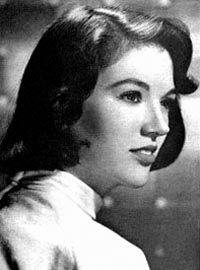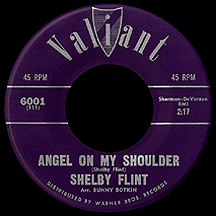SHELBY FLINT
Angel on My Shoulder
New Yorker Barry DeVorzon discovered North Hollywood-born singer Shelby Flint when she was 18 years old. DeVorzon had recently staked his claim as a songwriter with "Just Married" (cowritten with Al Allen), a hit for Marty Robbins in the spring of 1958. A few months later he got Flint her first-ever recording session, with Archie Bleyer arranging an unabashedly romantic song she had written, "I Will Love You." The single debuted in the fall on Bleyer's Cadence label amid hit releases by The Everly Brothers and other first-timers Link Wray and Johnny Tillotson, all of them performing at much louder decibels than she. Shelby, in fact, had just about the softest vocal style around, which makes her association with Barry D. a logical one (his 1976 instrumental hit with Perry Botkin, Jr., "Nadia's Theme (The Young and the Restless)," easily qualifies as one of the quietest pop hits of all time).
Shelby studied piano when she was very young and started playing guitar, and writing songs, at age 15. Her recorded romantic ode got lost in the late-'58 shuffle and more than two years passed before a chance to make another record presented itself. When Barry formed Valiant Records in 1960 with business partner Bill Sherman, she was the first artist they signed. Influenced by the folk music boom of the moment, she composed "Angel on My Shoulder," a sweetly hopeful song referring to romantic superstition, making mention of several good luck auspices in the lyrics: 'Got an angel on my shoulder, got a penny in my pocket...and I found a four-leaf clover, and I put it in my locket...wished on all the stars above me, and I caught the nearest rainbow...' Methinks she spoke for all the girls of a certain age, and some of the guys liked it too. 'Well I tossed a lot of nickels in a wishing well, and saved the fortunes that the fortune cookies tell...I got a lucky penny and a mustard seed, but a warm and tender love is all I need.' The only song I know of that mentions the oft-overlooked mustard seed! She even threw in a last-ditch finger-cross for added insurance. If such a thing is possible, Shelby sang this one even softer and with more conviction than the earlier Cadence recording. It became a top 30 hit in February 1961, immediately drawing attention to the new Valiant label.
Warner Bros. distributed that first single, and its success set up a permanent association between WB and Valiant (which peaked in 1966 with an extremely popular group called, coincidentally, The Association). DeVorzon produced most of Flint's sessions, occasionally cowriting songs with the young "thrush," as she was referred to in the trade publications of the day. Perry, Jr. was also part of the team, doing arrangements under the name Bunny Botkin. After a few nonhit follow-ups, they gave "I Will Love You" another shot with a newly-recorded version, but it missed the charts again (the undying love song finally hit in 1963 when Richard Chamberlain of Dr. Kildare fame recorded it...and women swooned). Shelby's "Little Dancing Doll," written by DeVorzon and Bodie Chandler, came out that same year; she again intersected folk music and teen romanticism and made a brief Billboard "Bubbling Under" appearance.

Five years on, Flint and DeVorzon had formed a tight bond and the two continued chasing that elusive second hit record. Don and Dick Addrisi (who'd hit with "Cherrystone" as The Addrisi Brothers in 1959 and had a few more ahead as a recording duo) were assigned the task of writing songs for Shelby. They answered the call in '64 and '65 with "Wonderland," "Lonely Cinderella" and others in an attempt to align her with the girl singers of the mid-'60s, yet still nothing connected. "Cast Your Fate to the Wind," with many recorded versions following the Vince Guaraldi Trio's late-'62 original (including charted versions by Sounds Orchestral and Steve Alaimo), was the song that put her back on the radio and the charts in the summer of 1966. A good argument can made for its being the definitive vocal version of the song.
Shelby Flint's influence on pop and/or teen music may not be clear, but her singing was an inspiration to at least one folk act, as Joni Mitchell has admitted she wanted to sound like Shelby at the start of her career. In 1967, Valiant was sold to its longstanding distribution affiliate Warner Bros., with Shelby still on the label's roster as part of the package, yet no records by her were released on the Warner label other than a "Back to Back Hits" 45 of her two biggest singles. At some point she and the company parted ways. In the 1970s her singing voice was heard on a number of projects, including the Peanuts feature film Snoopy, Come Home, TV movie The Borrowers and an early directorial effort by Clint Eastwood, Breezy. She also had voice acting roles in the animated TV movies The Stingiest Man in Town and Rudolph and Frosty's Christmas in July. Her contribution of three songs to Walt Disney's 1977 animated hit The Rescuers resulted in an Academy Award nomination for Sammy Fain, Carol Connors and Ayn Robbins, composers of "Someone's Waiting For You." At the Oscar show on March 29, 1978, Gloria Loring peformed not one, but two of the songs in competition for the award, including Shelby's. What a letdown! She missed her chance to sing in front of a far-reaching worldwide audience!
At any rate, Shelby Flint is still at it decades later, performing live, writing and recording, often in collaboration with guitarist Tim Weston (the son of singer Jo Stafford and bandleader Paul Weston) and jazz keyboard player Greg Karukas. I don't know if the good luck charms lyricized in "Angel on My Shoulder" brought the romance she sought, but she did manage to parlay them into a lifelong music career!


